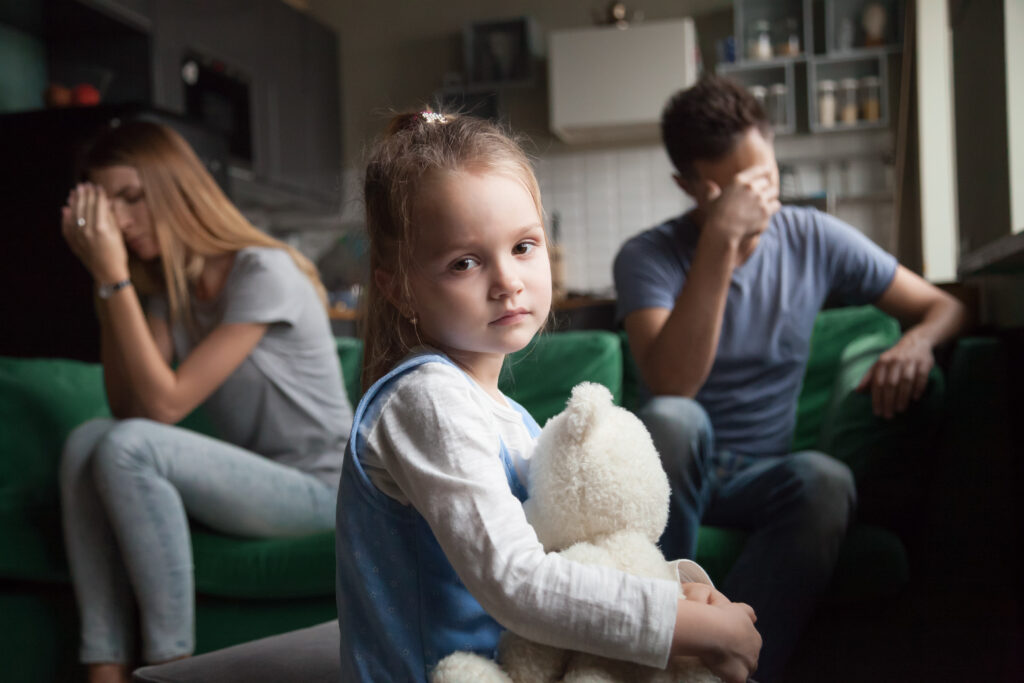
Carrying a childhood trauma around with you is an enormous psychological burden. Bad experiences in early childhood can shape you for the rest of your life. It is almost impossible to build trusting relationships if you had to go through traumatic experiences as a child.
Emotional Overload manifests itself in behavioral problems and anxiety. Nevertheless, the consequences of psychological traumatization in children are often overlooked or trivialized. There are various psychotherapeutic methods available for overcoming trauma. The first step towards healing is Self-acceptance.
What is childhood trauma? Does trauma occur when parents have little time or do not take good care of their children? Do quarrels in the family cause emotional upheaval?
From the perspective of psychology, childhood trauma is defined as a "profound psychological injury". Trauma in childhood can be caused by events with serious consequences, such as
into consideration. However, whether a bad experience has long-term traumatic consequences depends on how those affected process their experiences. Basically, any situation that is emotionally overwhelming can result in serious psychological injuries.
Feelings are very personal. Every child deals with childhood experiences differently. Your own evaluation of traumatic memories still influences your life in adulthood.
A positive mindset can be a great support to you in your spiritual healing. Positive thinking promotes the process of trauma healing. Good thoughts enable us to take action and help us to get up again after bad experiences and move on.

Childhood trauma leaves scars on the soul. The effects often only become apparent years later. Typical consequences of childhood trauma in adulthood are anxiety, depression and a lack of Self-esteem. Recognizing the hidden consequences of traumatic experiences is a prerequisite for avoiding late effects in adulthood.
The way you think about traumatic childhood experiences has a major influence on the healing process. Do you want to work through your childhood trauma? Look at the events of that time from a different perspective. Learn to forgive!
Forgive those who may have harmed you without malicious intent. In the case of severe childhood trauma that does not allow for forgiveness, distance is the best solution. Take care of yourself. Benevolent care for yourself helps to overcome feelings of helplessness.
And above all, you can also realize that the little child was definitely not responsible for the situation back then. Now, as a big adult, you can feel the pain for your Heal the inner child.
Traumas are difficult experiences that call your whole life into question. Childhood trauma affects your self-image and your relationships. Did you suffer a loss of trust in early childhood? Then you will later find it difficult to trust other people. trust.
Were you mistreated, beaten or even abused as a child? Early childhood trauma has a negative impact on the way you see yourself. The consequences of this are negative self-esteem, feelings of inadequacy and a lack of self-confidence. Self-confidence.
Inability to bind or Commitment Anxiety arise from difficult experiences in childhood. Did you experience your parents as an arguing couple? Did you have to suffer from Separation or divorce? These experiences don't exactly make it easy to find a Relationship to enter into.
Memories of childhood trauma are often linked to strong fears. Traumatized people are afraid of situations, places or people that are associated with the trauma they experienced.
In psychology, the stimuli that unconsciously awaken memories of a bad event are known as triggers. Fears from traumatic experiences can be alleviated by consciously dealing with them. The following five steps can help you move towards healing and self-acceptance:
Provide a safe environment in which you feel comfortable. This could be a cozy corner in your home, for example. Get used to avoidance behavior and develop helpful habits. Allow your feelings. Consciously perceive and Accept can alleviate feelings of anxiety.
Cultivate social contacts. Join a club or learn a new hobby. Learn a relaxation technique. Meditation helps you to let go of mental baggage and to inner peace to arrive.
When life has been shaped by traumatic experiences and Fears is severely restricted, you should seek professional help. Psychologists and psychotherapists support people with childhood trauma through various therapeutic measures.
First of all, the question arises: Do I need a childhood trauma test or is it superfluous? A childhood trauma test can be informative in order to recognize whether the feelings of anxiety are actually due to traumatic experiences.
Traumas rarely heal by themselves. With professional support and suitable therapy, however, serious experiences can be better processed.
The following therapeutic concepts are used in trauma healing:
Don't hesitate to seek therapeutic support if you are tormented by anxiety. Fighting childhood trauma alone is a major challenge. Scientifically proven psychotherapies are effective and help you to cope better with feelings of anxiety. You will also learn to better understand the causes that led to the trauma.
The first step in overcoming childhood trauma is to recognize the causes. What is behind the traumatic experience? Why did the psychological injuries occur? Do you know the feeling of being at the mercy of others? The actual trauma is often not the terrible experience, but the feeling of absolute helplessness.
The past Experiences shape your life in adulthood. Current fears are the result of unresolved trauma. Come to terms with your past. As an adult, you will reassess many things that happened back then.
Practical self-care measures help to heal a soul wounded by childhood trauma. The key to healing is self-care. These eight steps will pave the way to a healthy, carefree future:
Turn your gaze inwards. Be aware of your needs. Accepting yourself is an important prerequisite for practising self-care. Have you ever asked yourself: How do I feel? What are my wishes? It is important to treat yourself with love so that you feel good emotionally.
Strong relationships provide a secure framework for growth and development. For this, a relationship but also healthy Boundaries. No one should be patronized in a partnership, in friendships, acquaintances or at work.
Personal boundaries are important. You decide what you want and what you don't want. Share your expectations and communicate clearly what behavior constitutes a boundary violation for you. Setting boundaries is an act of Self-love.
The key for positive changes in your social interactions is in your own hands. Define your needs. Show your Appreciation towards others. Be positive towards other people. Demand understanding and respect for yourself in return.
Overcoming childhood trauma requires time, self-reflection and often professional support. However, with a positive mindset, a willingness to take care of yourself and the realization of your own strength, you can find a way to heal and move on. personal growth find.
For inspiration, we recommend our Visions Challenge. This includes videos, exercises and meditations that accompany you over 7 days. The Vision Challenge can help you to overcome blockages. Beliefs and realign your focus.

